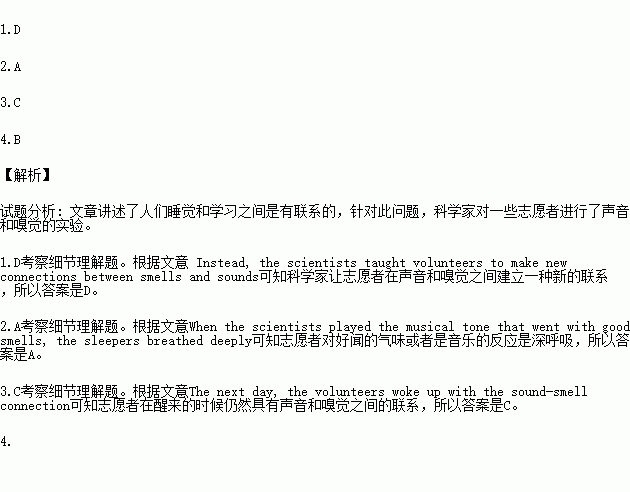题目内容
Scientists have proved that sleeping and learning go hand in hand. Even a short nap can boost our memory and sharpen our thinking. But the relationship goes deeper than that.
“The brain is not passive while you sleep,” scientist Anat Arzi said. “It’s quite active. You can do many things while you are asleep.”
Arzi and her coworkers didn’t try to teach the sleeping volunteers any complex information, like new words or facts. Instead, the scientists taught volunteers to make new connections between smells and sounds.
When we smell something good, like a flower, we take deep breaths. When we smell something bad, we take short breaths. Arzi and her co-workers based their experiment on these reactions.
Once the volunteers fell asleep in the lab, the scientists went to work. They gave them a whiff of something pleasant and meanwhile played a particular musical note. They didn’t wake up, but they heard—and sniffed(吸气) deeply. Then the scientists gave the volunteers a whiff of something terrible and played a different musical note. Again, the volunteers heard and smelled—a short snort this time—but didn’t wake up. The researchers repeated the experiment.
After just four repetitions, volunteers made a connection between the musical notes and their paired smells. When the scientists played the musical tone that went with good smells, the sleepers breathed deeply. And when the scientists played the musical tone that went with bad smells, the sleepers breathed briefly—despite there being no bad smell.
The next day, the volunteers woke up with the sound-smell connection. They breathed deeply when hearing one tone and cut their breaths short when hearing the other, which must have been unusual for them. Imagine walking down the street and taking a deep breath upon hearing a particular sound!
1.In the study, the volunteers were taught _______.
A. to become active during sleep
B. to tell the difference between smells
C. to learn new words and scientific facts
D. to make sound-smell connections
2.How did the volunteers react when smelling something nice and hearing musical notes?
A. They took a deep breath.
B. They had a wonderful dream.
C. They woke up at once.
D. They took a short breath.
3.When the volunteers woke up the next day, they_______.
A. learned how to play to musical tones
B. forgot what happened during their sleep
C. continued with the sound-smell connection
D. changed their reaction when hearing the sound
4.The passage mainly tells us _______.
A. special smells and sounds can improve our memory
B. our brain can actually learn something new during sleep
C. the volunteers will always hear similar sounds on the street
D. our brain can tell the difference between smells during sleep

